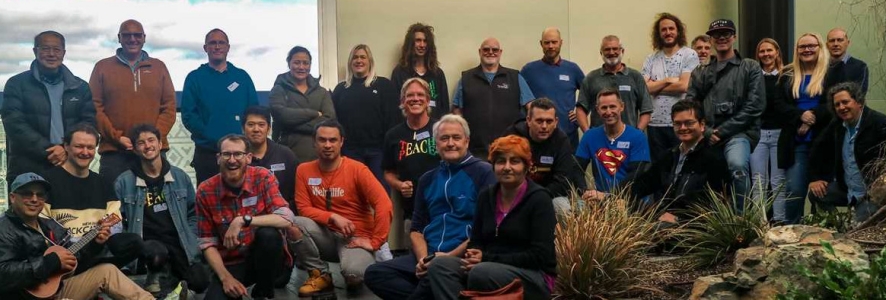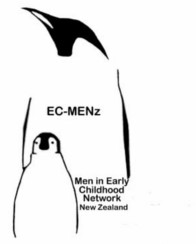EC-MENz National Summit 2026 will be held in Wellington on Saturday 21 March
More details to come!
EC-MENz National Summit 2025
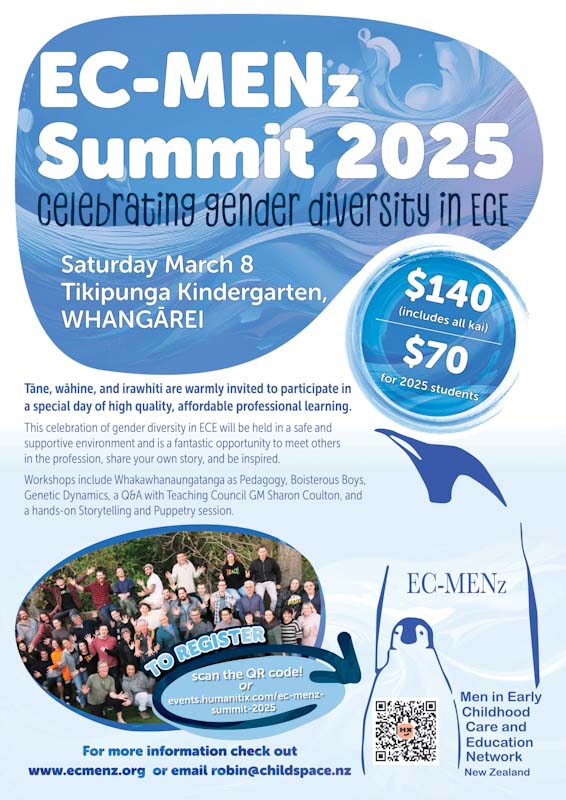
Celebrating gender diversity in ECE
Saturday March 8
Tikipunga Kindergarten, Whangārei
Tāne, wāhine, and irawhiti are warmly invited to participate in a special day of high quality, affordable professional learning. This celebration of gender diversity in ECE will be held in a safe and supportive environment and is a fantastic opportunity to meet others in the profession, share your own story, and be inspired.
Workshops include Whakawhanaungatanga as Pedagogy, Boisterous Boys, Q&A with Teaching Council GM Sharon Coulton, and a hands-on Storytelling and Puppetry session.
$140 (includes all kai), $70 for Northland Kindergarten Association whānau, $70 for 2025 students.
For more information check out www.ecmenz.org or email This email address is being protected from spambots. You need JavaScript enabled to view it.. To register, please head to https://events.humanitix.com/ec-menz-summit-2025
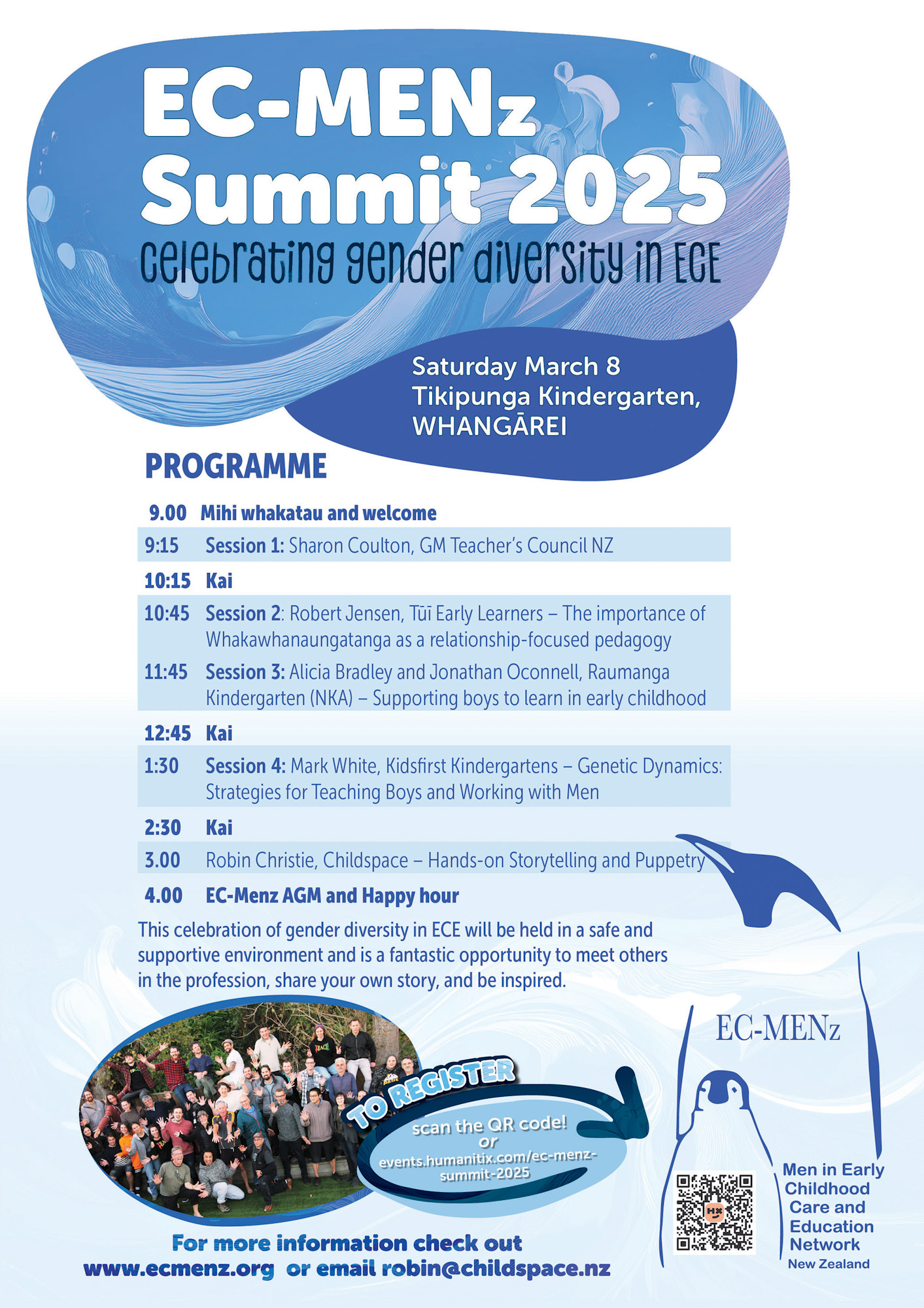
Speakers

Robert Jensen - The importance of Whakawhanaungatanga as a relationship-focused pedagogy
Abstract
Dive into an immersive wānanga that explores the intentional practice of whakawhanaungatanga to create deep, meaningful connections with ākonga, parents, and whānau within an early childhood setting. The wānanga is based on Robert's research carried out during his specialist teaching postgraduate studies in Early Intervention at Massey University, offering fresh insights and practical strategies to building strong, culturally grounded relationships.
Participants will reflect on their teaching practices from a te Ao Māori perspective, discovering how values like manaakitanga, kotahitanga, and mana whenua can enhance positive learning outcomes. Through interactive activities using mentimeter.com, you’ll actively participate in word clouds, polls, and collaborative exercises that bring concepts like manaakitanga, kotahitanga, and mana whenua to life. Leave inspired and equipped with practical strategies for fostering unity, belonging, and empowerment in your educational community. Perfect for teachers and leaders committed to fostering positive educational outcomes through culturally responsive teaching.
Bio
Robert brings 18 years of experience in early childhood education, including five years as a Head Teacher. He currently serves as an Early Intervention Leader for Tūī Early Learners, a family-owned group of early learning centres with over three decades experience offering quality education and care in the Manawatū. Recently, he completed postgraduate specialist studies in Early Intervention at Massey University, with a focus on early intervention processes, neurodiversity, and intentional teaching strategies to support children’s social-emotional development and self-regulation skills.
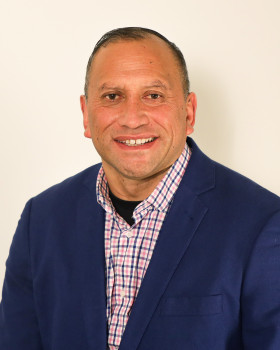
As Deputy Chief Executive (Whanganui, Taranaki Whanui, Ngāti Tuwharetoa, Ngāti Raukawa, Nga Wairiki, Ngāti Apa), Tamahau leads the Council in our vision of being a Te Tiriti-led and values based organisation. A husband, a father, a grandfather, a brother, a son, a uncle and prior to joining the Teaching Council, he has been an Iwi leader, cultural advisor, a lecturer, a teacher and a health worker.
Tamahau Te Rau, Deputy Chief Executive | Pou Kaiāwhā of the Teaching Council of Aotearoa New Zealand, will present a keynote that delves into gender equity in the early childhood education (ECE) profession. His keynote will challenge and debunk common stereotypes ECE teachers face, highlighting the crucial role they play in shaping the lives of our kōhungahunga. He will reference statistics from the New Zealand Teachers Disciplinary Tribunal and explore the Teaching Council’s vision of strengthening the mana of teachers, empowering them to change lives. Tamahau will also address the Teaching Council’s recent media release regarding the ECE regulation review, offering insights into the ongoing efforts to support and strengthen the profession. He is excited to explore these vital topics with you.
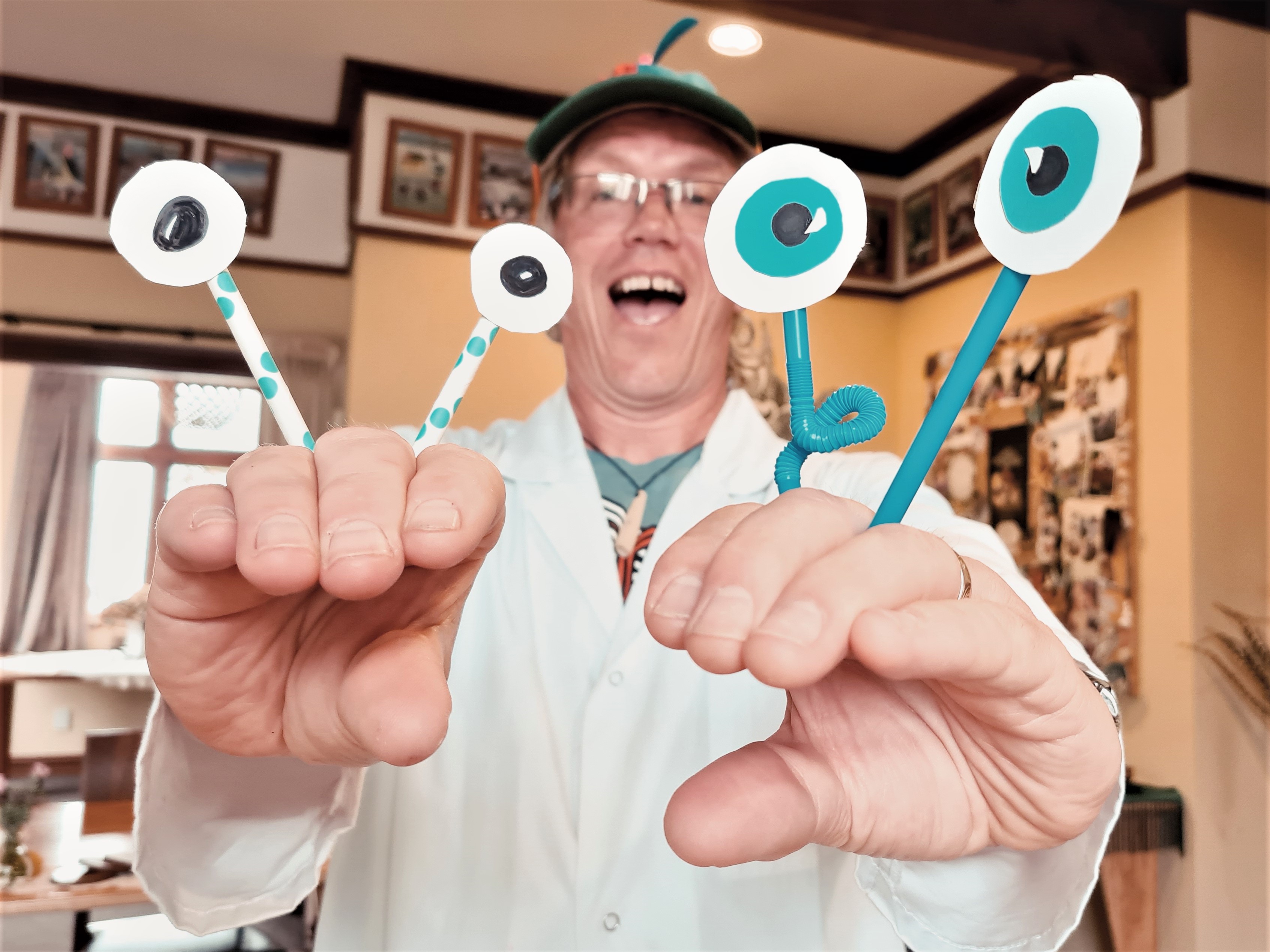
Hands-on Storytelling – Robin Christie
Storytelling has always been an essential part of early childhood education, helping children to understand the wider world, to illustrate moral concepts, and of course, to entertain! This hands-on session will provide simple storytelling ideas to foster children’s natural love of language and narrative. Songs, puppets, and disguises all included!
Bio
Robin Christie is an experienced early childhood teacher passionate about fostering confidence in the creative arts in both tamariki and kaiako. Robin loves to play the ukulele, sing, draw, dance, dress up in any costume he can lay his hands on, fall over in a really theatrical way and generally play the fool. He sees gender diversity in our ECE profession as absolutely vital in enabling children to fully realise their potential.
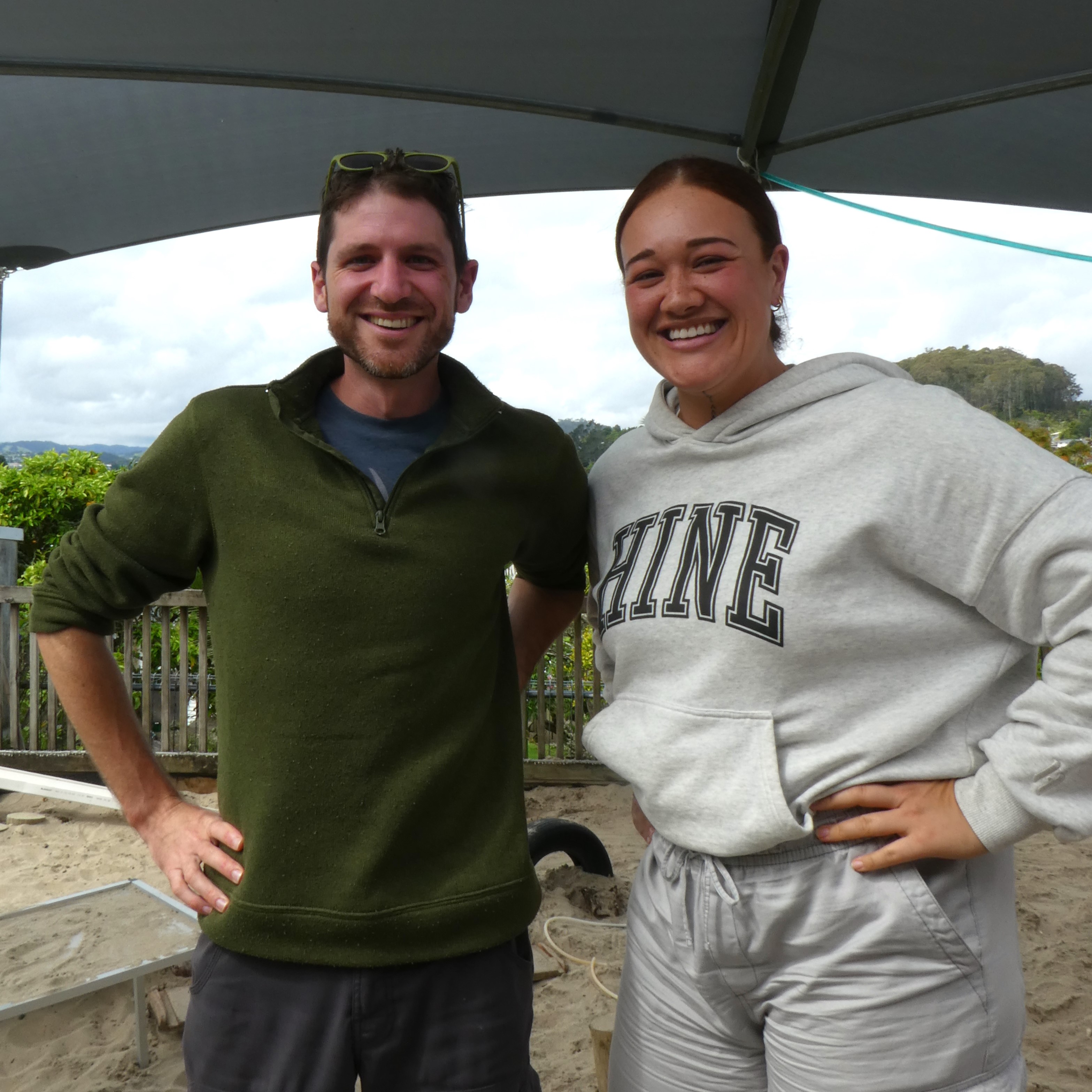
Supporting boys to learn in early childhood.
Alicia Bradley and Jonathan Oconnell from Raumanga Kindergarten in Whangarei share what they have learned in their PGC focus on supporting boys to learn in their setting. Alicia will be sharing some practical strategies and activities you can use to support boys learning while Jonathan brings some interesting research to the table and questions if we are really setting boys up for success.
Bio:
Alicia Bradley and Jonathan Oconnell have been teaching at Raumanga Kindergarten in Whangarei for two years together and recognized the need to dive deeper and explore the ways in which boys learn best. By seeking research, PD, and with plenty of trial and error, they have made progress toward understanding the unique challenges that boys face in early childhood and learned strategies to provide them opportunities to thrive.
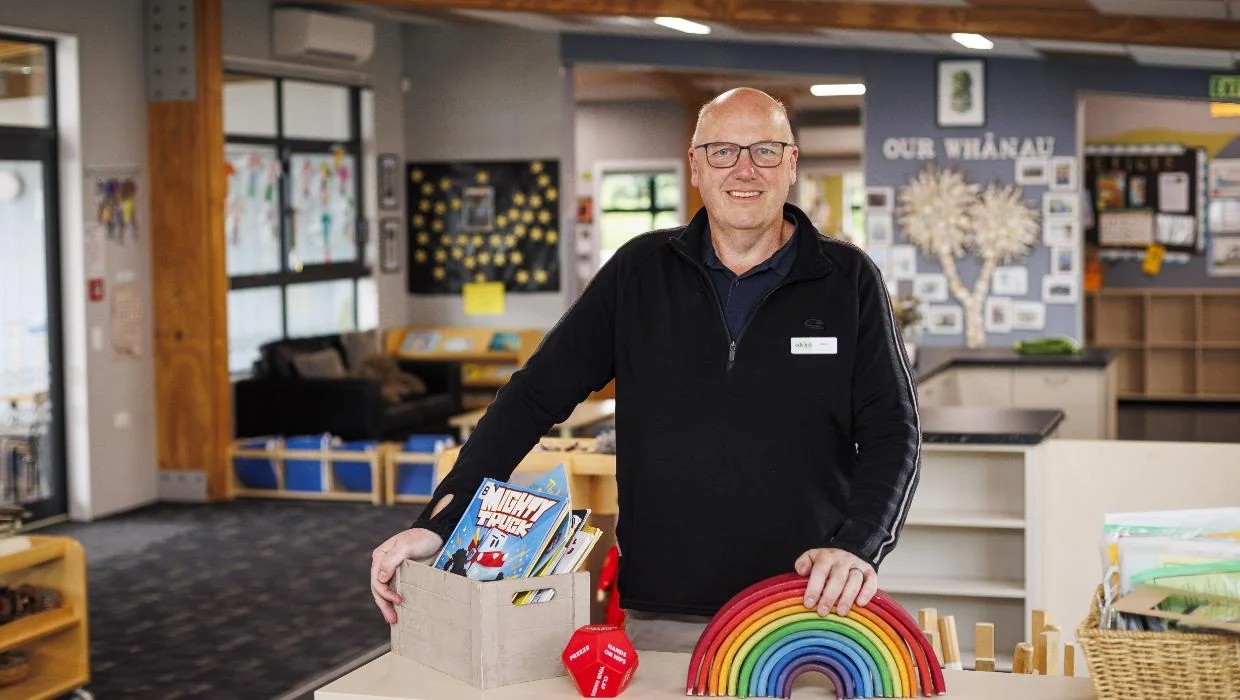
Genetic Dynamics – Strategies for Teaching Boys and Working with Men
Understanding genetic dynamics is crucial for developing effective strategies for teaching boys and working with men. Genetic factors can influence learning styles, behaviour, and cognitive development, making it important to tailor educational and workplace approaches accordingly. Boys often benefit from active learning, hands-on activities, and competitive elements, which align with their genetic predispositions for higher physical activity and spatial skills. In the workplace, recognising genetic influences on traits such as risk-taking and problem-solving can help in managing and collaborating with men. By integrating these genetic insights, educators and managers can create more inclusive and productive environments, ultimately fostering better learning and working experiences.
Mark came to Early Childhood Education later in life, after a long career managing Garden Centres in the UK and New Zealand, remembering the fulfilment of teaching biology and ecology in Africa as a younger man. Over the last 15 years Mark and been a teacher, head teacher, and senior teacher for a Kindergarten association, with a particular passion for outdoor education. Through completing postgraduate specialist studies in Early Intervention, with a focus on supporting four key aspects of child development – their physical, cognitive, behavioural, and social and emotional development, alongside recognising the powers of nature and nurture through being an adoptive parent, Mark has an interest in the environmental and biological conditions that influence us.
Summit Reports
